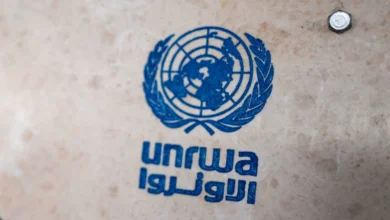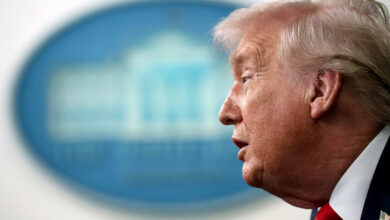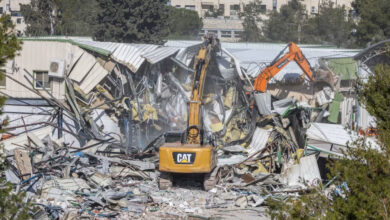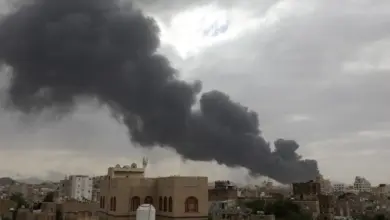
DUBAI, United Arab Emirates (AP) — A United Nations appeal Tuesday for countries to fund emergency aid in Yemen, where more than five years of war have collapsed the country’s health care system, raised US$1.35 billion — a billion dollars short of what aid agencies needed.
The amount raised is also half of the $2.6 billion that countries pledged at the same conference last year. It is meant to cover Yemen’s needs through the next six months.
Aid agencies say Yemen is in dire need of assistance as the coronavirus threatens to decimate a health care system already ravaged by civil war.
Saudi Arabia, which co-hosted the UN pledging event, said it would pay half a billion dollars in aid for Yemen this year, $300 million of which will be funneled to the UN and related aid agencies. It was the largest amount pledged by any country.
The kingdom, which has been at war in Yemen since 2015 against Iran-allied Houthi rebels, hopes to use the event to showcase its role as one of the largest donors of aid to the war-torn country. The conflict has killed more than 100,000 people and displaced more than three million.
The United Arab Emirates, an active and close partner of the Saudis in the war in Yemen, offered no funding during the conference.
In his remarks at the virtual pledging event, UN Secretary-General Antonio Guterres stressed that ending the war is the only way to address the humanitarian crisis in Yemen.
The situation is “catastrophic,” added Mark Lowcock, the UN under-secretary-general for humanitarian affairs and emergency relief coordinator.
“That is what more than five years of war has done to Yemen. The health system is in a state of collapse,” he said. “Things are worse today than at any time in recent history.”
Meanwhile, Guterres said death rates from the COVID-19 virus in the southern city of Aden alone are among the highest in the world.
“There are shortages of testing devices, oxygen, ambulances and basic protective equipment,” he said. “Even hospitals that are operational and equipped may not have a reliable electricity supply.”
Compounding myriad problems Yemenis face is access to consistent electricity and clean, running water needed for sanitization in the fight against the coronavirus, as well as cholera, which more than 2.3 million people have contracted since 2017.
Additionally, two-thirds of the country’s roughly 30 million people rely on food assistance, while more than 310,000 children suffer severe acute malnutrition due to starvation.
The US commitment to Yemen this year stands at $225 million. Other major pledges came from the UK with $195 million and Germany at $138 million.
The dwindling funds are the result of several factors, but among the top reasons is obstruction by Yemen’s Houthi rebels, who control the capital, Sanaa, and other territories. The United States decreased its aid to Yemen earlier this year, citing interference by the Houthis.
Also, more than a dozen UN aid workers deployed to deal with Yemen’s humanitarian crisis have been accused of joining with combatants on all sides to enrich themselves from the billions of dollars in donated aid flowing into the country.
Furthermore, nations around the world are facing domestic economic fallout from the coronavirus, which could impede efforts to shore up aid for countries like Yemen.
Aid groups had called for at least $2.4 billion to cover essential needs in Yemen for the coming six months, including programs to counter COVID-19. The UN warned that if funding is not secured, more than 30 UN programs in Yemen will close in the coming weeks.
Already, some 75 percent of UN programs in Yemen have had to shut their doors or reduce operations. The global body’s World Food Program had to cut rations in half and UN-funded health services were reduced in 189 out of 369 hospitals nationwide.
Lowcock said the biggest challenge now facing Yemen is money: The country is in urgent need of it and most of the pledges made by countries have not been paid.
While Saudi Arabia was the top donor country to Yemen in 2019, this year the kingdom has paid just $16 million of the $500 million pledged, according to tracking figures by the UN.
Lowcock urged countries to pay their pledges immediately because “pledges on their own do nothing.”
Critics questioned Saudi Arabia’s high-profile role in rallying humanitarian support even as it engages in continued warfare against the Houthis.
Yemen researcher at Human Rights Watch, Afrah Nasser, accused Saudi Arabia of “trying to whitewash its coalition’s role in the deepening humanitarian catastrophe in Yemen.” She called on all parties to the war to immediately cease the conflict and put an end to the crisis.
___
Michael reported from Cairo. Associated Press writer Edith M. Lederer contributed from the United Nations.
Image: In this May 21, 2020, photo, grave diggers bury a body at Radwan Cemetery in Aden, Yemen. At a cemetery in Yemen’s largest southern city, dozens of fresh graves are a testament to a spike in deaths amid the coronavirus pandemic. The cemetery workers who bury them don’t know what killed the newly deceased. But there’s no denying that there’s been an increasing number of people getting sick in the port city of Aden — likely from the coronavirus. (AP Photo)




